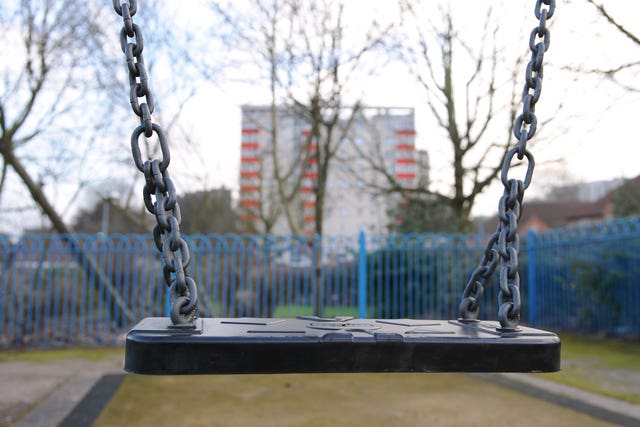
More than 13,000 hospital admissions of children each year between the ages of 11 and 15 are prevented because of early years centres, a report has said.
The positive effects of Sure Start centres are “substantial”, the Institute for Fiscal Studies (IFS) concluded, with the main benefits flowing to poorer neighbourhoods.
Sure Start, introduced by the Labour government in 1999, provides centres giving help and advice on child and family health, parenting, money, training and employment, with some also offering early learning and day care for pre-school children.
The new research, funded by the Nuffield Foundation, states that the scheme averts almost twice as many hospital admissions among older children as it induces in one-year-olds.
The findings, which come ahead of the autumn spending review, should be a reminder that a programme’s potential for long-term savings must be considered rather than just up-front costs, one of the report’s co-authors said.
The report found that in the early years of a child’s life, Sure Start increases hospital admissions “as families get more support to use health services and as children are exposed to a wider range of infectious illnesses”.
But there follows a decrease, with the IFS concluding that Sure Start “decisively reduces hospitalisations”, with stronger immune systems, better disease management, safer home environments and fewer behavioural problems all potentially playing a role.
The report states: “These effects are substantial; our calculations suggest that an additional centre per 1,000 children under five, on average, generates around 6,700 additional hospitalisations of one-year-olds each year.
“But it also prevents around 13,150 hospitalisations each year between the ages of 11 and 15 – meaning that Sure Start averts nearly twice as many hospitalisations among older children as it induces in one-year-olds.”
The fall in hospital admissions as a result of the scheme was concentrated among boys and in more disadvantaged areas, especially at later ages, the report said.
It added that there was “almost no evidence” that Sure Start had improved children’s hospital admission outcomes in the richest neighbourhoods.
The report noted that “policy decisions since 2010 have not systematically protected the centres serving the poorest areas”.
It said the research suggests prioritising spending on early years programmes towards those areas, or shielding them from cuts, would help to ensure services are better targeted to benefit children’s health.
Maud Pecher, a co-author of the report, said: “By bringing together a wide range of early years services for children under five, Sure Start centres dramatically improved children’s health even through their teenage years.
“Children who had greater access to Sure Start in their early years were far less likely to be hospitalised later on – at its peak, Sure Start provision prevented over 13,000 hospitalisations of 11 to 15-year-olds each year.

“These benefits were particularly long-lasting for boys and children in disadvantaged neighbourhoods.”
Sarah Cattan, IFS associate director and also a co-author of the report, said: “The savings from reduced hospitalisations up to age 15 offset around a third of the cost of the Sure Start programme – and that’s before considering any potential benefits in education, social care or crime.
“Ahead of this autumn’s tight spending review, these results are a reminder that policymakers should consider a programme’s potential for long-term savings, not just its up-front costs.”
The Government should have “no hesitation in making a significant investment into early childhood development”, according to Early Years Alliance chief executive Neil Leitch.
He said: “The fact that the Sure Start programme is still paying dividends for children into their teenage years is yet more confirmation of what we already know – that investing in young children is not only the right thing to do, it is also a sound financial decision.
“Recent governments have shamefully let down children and families by not only cutting Sure Start services which reduce hospitalisations, and do much more good besides, but also by allowing funding for under-five education to dwindle to far less than the cost of delivering it.
“If the Government genuinely cares about our national finances, it should have no hesitation in making a significant investment into early childhood development, since the high-quality early years provision all children deserve will more than pay for itself in the years to come.”
A Department for Education spokesperson said: “We recognise that the early years of a child’s life are the most crucial, which is why we have put unprecedented investment into childcare over the past decade, including over £3.5 billion in each of the past three years.
“We are investing more than £14 million to champion family hubs, as well as targeted support for speech, language and communications skills through the Nuffield early language intervention programme.”
The spokesperson added councils are being encouraged to publish a “start for life” offer to make parents and carers aware of what is available in their area for young children.
Shadow children’s minister Tulip Siddiq, said: “For over a decade, Conservative governments have failed to listen to families who have been unable to get the childcare, early education and wellbeing support they need.
“Ministers must start listening and come forward with a proper plan to rebuild this essential infrastructure after a decade of neglect.”


Comments: Our rules
We want our comments to be a lively and valuable part of our community - a place where readers can debate and engage with the most important local issues. The ability to comment on our stories is a privilege, not a right, however, and that privilege may be withdrawn if it is abused or misused.
Please report any comments that break our rules.
Read the rules here